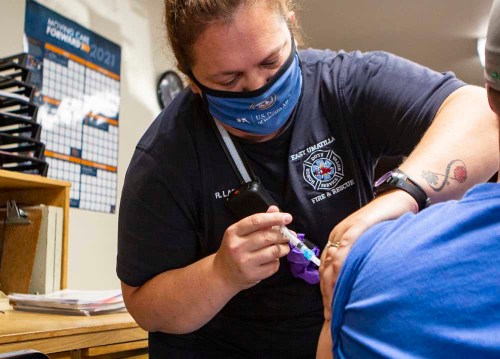OHSU: Peak Oregon omicron hospitalizations could be half of previous prediction
Published 11:00 am Tuesday, December 28, 2021

- Registered nurse and firefighter Rachelle Lasater administers a dose of the Johnson & Johnson COVID-19 vaccine Sept. 7, 2021, at the East Umatilla County Ambulance Area Health District office in Athena.
SALEM — Oregon’s COVID-19 omicron hospitalization peak won’t be nearly as bad as forecasters predicted a week ago but still could overwhelm the health care system within weeks with about as many people needing hospital beds as did during the delta wave.
Oregon Health & Science University revised its omicron surge projections Thursday, Dec. 23, down from about 2,400 people hospitalized at the peak of the upcoming surge to about 1,200, provided Oregonians take steps to prevent the spread of infections.
Trending
The peak, which is expected to hit in early February, could exceed 1,700 if Oregonians’ behavior doesn’t change, though it always has in the past when infections have started to climb, OHSU data analyst Peter Graven said.
But while the downward revision could be heartening, the currently predicted wave of hospitalizations could still rival or exceed Oregon’s peak in early September.
“The risk of overwhelming hospital systems is real,” Graven said. “We’re seeing a dire situation.”
Graven said he incorporated new, more accurate data from countries fully in the throes of their omicron surges in his COVID-19 forecasting model, allowing him to make more accurate predictions for what will happen in Oregon.
The numbers could be revised down again next week, when Graven said he hopes to produce a forecast with yet more accurate data. The key variable driving the uncertainty is how likely an omicron infection is to land a vaccinated person in the hospital.
For his latest run at the data, Graven lowered omicron’s hospitalization rate, but upped the variant’s “immune escape,” or the rate at which the virus evades the defenses of immune systems that already had been exposed to the virus. He also upped his estimate of how many people, on average, will get boosters every day. The result showed a dramatically lower peak hospitalization rate.
Trending
The peak could end up even lower if Oregon’s efforts to get people boosted are particularly successful, according to Graven’s modeling.
Omicron-driven cases should start climbing now, Graven said, and hospitalizations soon will follow.
“One way we’re going to know is we’re going to see a lot more breakthrough cases,” Graven said.
Oregon Health Authority experts have said the variant likely already is the dominant one in Oregon, though there is such a lag in sequencing data the state does not know for sure.
COVID-19 cases among vaccinated people have consistently accounted for about 30% of known infections since early November. With omicron, people who have had a regular course of two doses of the vaccine appear to be just as likely to get infected as those who haven’t been vaccinated, research shows.
The omicron variant appears to cause milder illness, but spreads so easily and so fast the sheer volume of sick people is expected to send hundreds to the hospital. Having two shots of the vaccine helps prevent serious illness but does not always do so. Boosters are considered the best available option for those who are eligible.
The Oregon Health Authority and Gov. Kate Brown last week put the state on notice after Graven’s previous forecast came out, urging 1 million more Oregonians to get a booster shot.
The health authority announced Dec. 23 it will open four clinics, in addition to the six already in service. The agency has asked providers to double or triple how many doses they administer each week. The health authority also has hired 60 additional vaccinators, who will be sent to help at medical facilities around the state, spokesperson Rudy Owens said.
But the health authority plans to shut down all six of its high-volume clinics for some portion of the holidays, citing health care workers’ exhaustion.
“We want to ensure they get a much deserved opportunity to rest and spend time with their friends and families,” Owens said in an email.
And, per the OHA, the state’s clinics aren’t the core engine behind the statewide vaccination effort. The high-volume sites will administer about 10% of the shots to be provided statewide, Owens said.
“We believe it will be more efficient and productive to scale up existing providers like clinics and hospitals where we can,” Owens said.
Vaccine clinics are scheduled to be open next week in Sisters, La Pine and Bend. Details can be found online at, www.deschutes.org/health/page/covid-19-vaccine. In addition, appointments are available at local pharmacies by visiting www.vaccines.gov and many local health care providers offer appointments. Providers ask those seeking vaccines to call ahead for an appointment.









